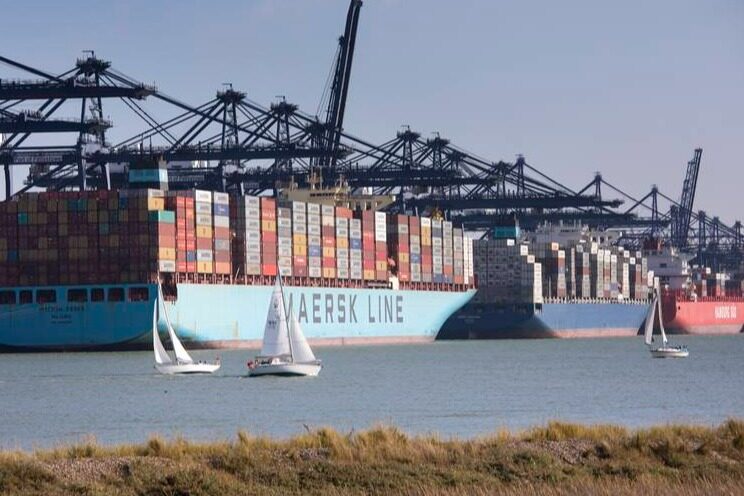- The global trade agency said the UK did not publicly support the proposed fund before Cop26

On September 16, 2021, the shipping industry urged the United Kingdom to support its US$5 billion "lunar exploration" research and development fund, which aims to achieve zero ocean emissions in the water by 2030 and help the industry achieve net zero emissions by 2050 .
The International Chamber of Shipping said that although the British government called for net zero global ship emissions by 2050 earlier this week, the United Kingdom has not yet supported a proposal to fund the development of alternative zero-carbon fuels and propulsion systems to ensure that this goal can be achieved. ICS Deputy Secretary-General Simon Bennett said that before the United Kingdom hosts the Cop26 Environmental Summit in November, it is necessary to ask the British government why they do not publicly support this industry proposal. Net zero is reasonable, but it makes sense only if the government cooperates with the industry and does its best to achieve this. This includes approving this research fund so that we can speed up the technology.
So far, the US$5 billion R&D fund has been supported by 10 countries including Japan, Malta, Nigeria, Singapore, Switzerland and Denmark. Although international regulations require that the global shipping industry’s emissions be reduced by 50% from 2008 levels, the British Chamber of Shipping stated earlier this week that it hopes the International Maritime Organization will double this goal and promise to achieve net zero by the middle of this century. emission. British Transport Secretary Grant Shaps (Grant Shapps) said earlier this week: Acting now allows us to lead this global transformation, creating highly skilled jobs for British workers, and creating a clean environment for future generations. Shipping and trade pattern.
The government stated that it is pushing for absolute zero emissions, which means there is no offset and no carbon emissions, which greatly increases the ambitions of the industry, which currently accounts for 3% of global emissions. The United Kingdom supports the net zero goal of international shipping in 2050, that is, to transport goods worth approximately US$14 trillion each year, which must be agreed through the International Maritime Organization (IMO), the United Nations shipping regulatory agency. This week, Sharps also emphasized his ambition to put zero-emission ships into commercial service by 2025.
Bennett said the industry has accepted the challenge to achieve the IMO's goal of halving emissions by 2050. However, he said: The current problem is that the level of technical preparation is not mature enough. "There are always statements about the exciting new development of zero-carbon ships, but realistically speaking, it is difficult to see how we will have thousands of zero-carbon ships by 2030, given that the 25-year life of ships will be necessary Yes, if we want to have a realistic opportunity to achieve the goal of 2050." He said.
ICS Secretary General Guy Platten (GuyPlatten) said that decarbonization is the top priority of every shipping company, and the industry understands the need for compromise and makes quick efforts. However, if the industry is to achieve the IMO's very challenging goals, something needs to happen. He said. These measures include: establishing the right zero-carbon fuel on a scale, conducting research and development to achieve the highest level of technology and preparation, and adopting market-based measures to encourage shipowners to switch to zero-carbon fuel ships and achieve this transition.
ICS, which represents the world’s national shipowners’ associations and more than 80% of the merchant fleet, submitted a report to the United Nations for the first time earlier this month, calling for internationally recognized market-based measures to accelerate the absorption and deployment of zero-carbon fuels. The proposal has been supported by some governments and the wider industry, requiring all ships in the world whose transaction size exceeds a certain size to pay a fixed amount of carbon dioxide emissions per metric ton. ICS said that this tax will be based on the mandatory contribution of global ship transactions, and for every ton of carbon dioxide emitted, the total tonnage will exceed 5,000 tons.
Although the Marshall Islands and Solomon Islands, two countries with large fleets and territories seriously threatened by climate change, have proposed a carbon tax of US$100 per ton, ICS said it opposes piecemeal regional measures, including the increase proposed by the European Commission. EU carbon market shipping volume measures. ICS says that instead, a global regulatory agreement is needed, and the funds generated from the taxation will be invested in climate funds to subsidize clean alternatives such as hydrogen until they compete with traditional fuels. ICS stated that this will "ensure that the green transitions of developed and developing economies are aligned."
This US$5 billion research and development plan is currently widely supported by governments and will be discussed again at the IMO Marine Environmental Protection Committee to be held two weeks after the Cop26 incident in November 2021. Bennett said: The shipping industry believes that unless the IMO member states approve this proposal at this session, it will be difficult to see how the IMO's goals set for 2050 will be achieved. We are a global industry and we need a global regulatory framework. The problem now is that the IMO has a very comprehensive industry decarbonization strategy.
Before this week’s London International Shipping Week, due to global supply constraints and a shortage of ships, ocean shipping prices have risen sharply in recent months. Boosted by rising demand, shipping companies are investing heavily to expand their fleets and equip them with new ships. Therefore, according to the latest estimates of the maritime brokerage company Banchero Costa, the new shipping capacity is expected to reach record levels by 2023. Other major announcements this week include a zero-emission submarine developed by a company that can transport cargo between Glasgow and Belfast and received 23 million pounds of government green maritime funding.
Keywords: new energy, overseas engineering, international engineering construction, foreign engineering construction news
The Department of Transportation (DfT) said that this fully automated vessel is designed to be "net positive" by using green hydrogen and collecting microplastics. According to DfT, a fleet can ensure 27 tons of carbon dioxide emissions in the first year of operation. Platten said that one of the biggest challenges facing the industry is "actually allowing policymakers and politicians to truly understand the true magnitude of the challenge."Editor/XuNing
Comment
 Praise
Praise
 Collect
Collect
 Comment
Comment
 Search
Search














Write something~